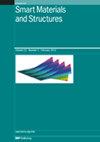Insight into constitutive theories of 4D printed polymer materials: a review
IF 3.8
3区 材料科学
Q1 INSTRUMENTS & INSTRUMENTATION
引用次数: 0
Abstract
Four-dimensional (4D) printing has emerged as a branch of additive manufacturing that utilizes stimuli-responsive materials to generate three-dimensional structures with functional features. In this context, constitutive models play a paramount role in designing engineering structures and devices using 4D printing, as they help understand mechanical behavior and material responses to external stimuli, providing a theoretical framework for predicting and analyzing their deformation and shape-shifting capabilities. This article thoroughly discusses available constitutive models for single-printed and multi-printed materials. Later, we explore the role of machine learning (ML) algorithms in inferring constitutive relations, particularly in viscoelastic problems and, more recently, in shape memory polymers. Moreover, challenges and opportunities presented by both approaches for predicting the mechanical behavior of 4D printed polymer materials are examined. Finally, we concluded our discussion with a summary and some future perspectives expected in this field. This review aims to open a dialogue among the mechanics community to assess the limitations of analytical models and encourage the responsible use of emerging techniques, such as ML. By clarifying these aspects, we intend to advance the understanding and application of constitutive models in the rapidly growing field of 4D printing.深入了解 4D 印刷聚合物材料的构成理论:综述
四维(4D)打印是增材制造的一个分支,它利用刺激响应材料生成具有功能特征的三维结构。在此背景下,构成模型在利用四维打印设计工程结构和设备方面发挥着至关重要的作用,因为它们有助于理解机械行为和材料对外部刺激的响应,为预测和分析其变形和形状移动能力提供了理论框架。本文深入讨论了单打印和多打印材料的现有构成模型。随后,我们探讨了机器学习(ML)算法在推断构成关系中的作用,特别是在粘弹性问题中,以及最近在形状记忆聚合物中的作用。此外,我们还探讨了这两种方法在预测 4D 印刷聚合物材料力学行为方面所面临的挑战和机遇。最后,我们对这一领域进行了总结并展望了未来。本综述旨在开启力学界之间的对话,以评估分析模型的局限性,并鼓励负责任地使用新兴技术,如 ML。通过澄清这些方面的问题,我们希望在快速发展的 4D 打印领域促进对构成模型的理解和应用。
本文章由计算机程序翻译,如有差异,请以英文原文为准。
求助全文
约1分钟内获得全文
求助全文
来源期刊

Smart Materials and Structures
工程技术-材料科学:综合
CiteScore
7.50
自引率
12.20%
发文量
317
审稿时长
3 months
期刊介绍:
Smart Materials and Structures (SMS) is a multi-disciplinary engineering journal that explores the creation and utilization of novel forms of transduction. It is a leading journal in the area of smart materials and structures, publishing the most important results from different regions of the world, largely from Asia, Europe and North America. The results may be as disparate as the development of new materials and active composite systems, derived using theoretical predictions to complex structural systems, which generate new capabilities by incorporating enabling new smart material transducers. The theoretical predictions are usually accompanied with experimental verification, characterizing the performance of new structures and devices. These systems are examined from the nanoscale to the macroscopic. SMS has a Board of Associate Editors who are specialists in a multitude of areas, ensuring that reviews are fast, fair and performed by experts in all sub-disciplines of smart materials, systems and structures.
A smart material is defined as any material that is capable of being controlled such that its response and properties change under a stimulus. A smart structure or system is capable of reacting to stimuli or the environment in a prescribed manner. SMS is committed to understanding, expanding and dissemination of knowledge in this subject matter.
 求助内容:
求助内容: 应助结果提醒方式:
应助结果提醒方式:


